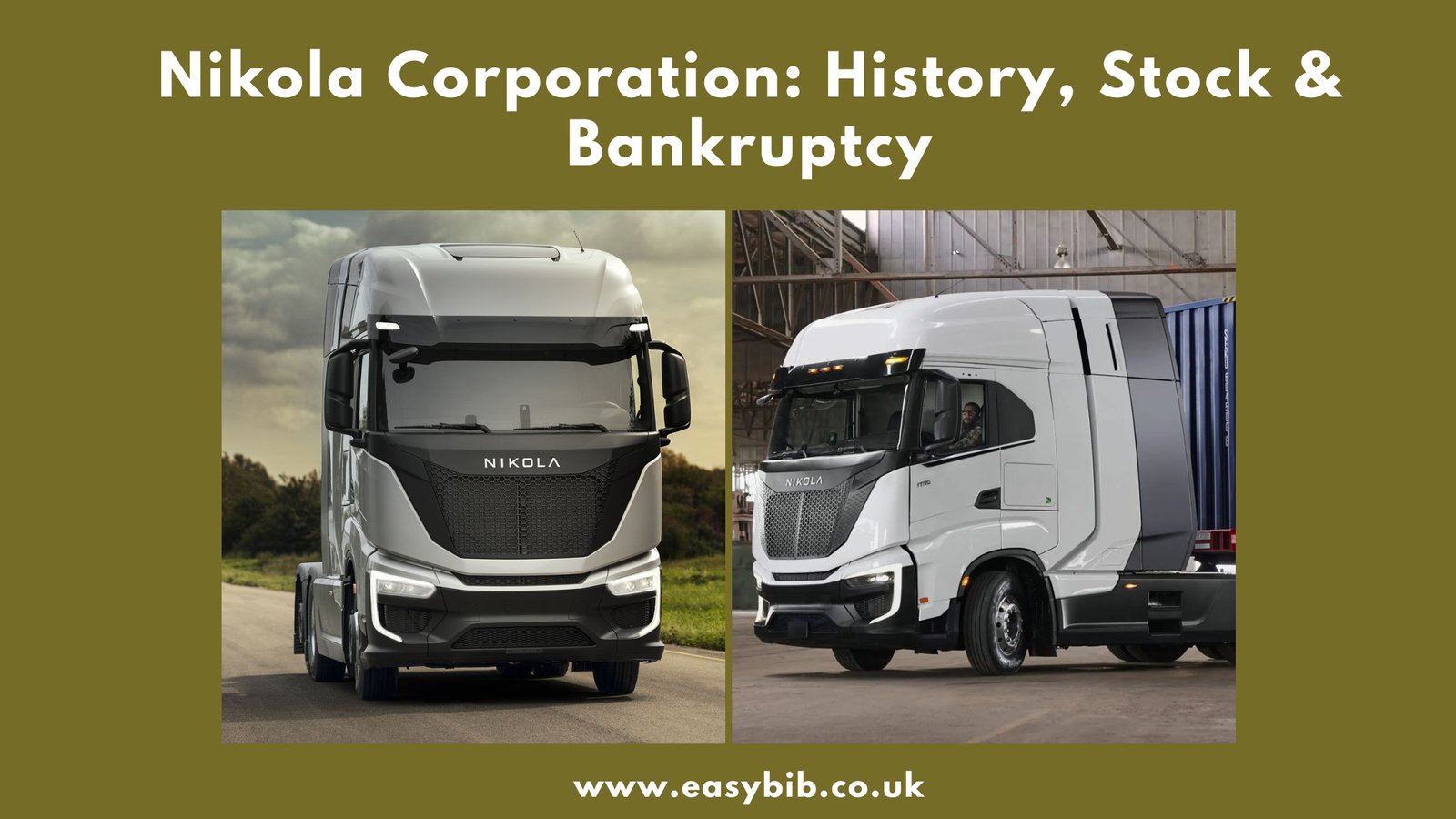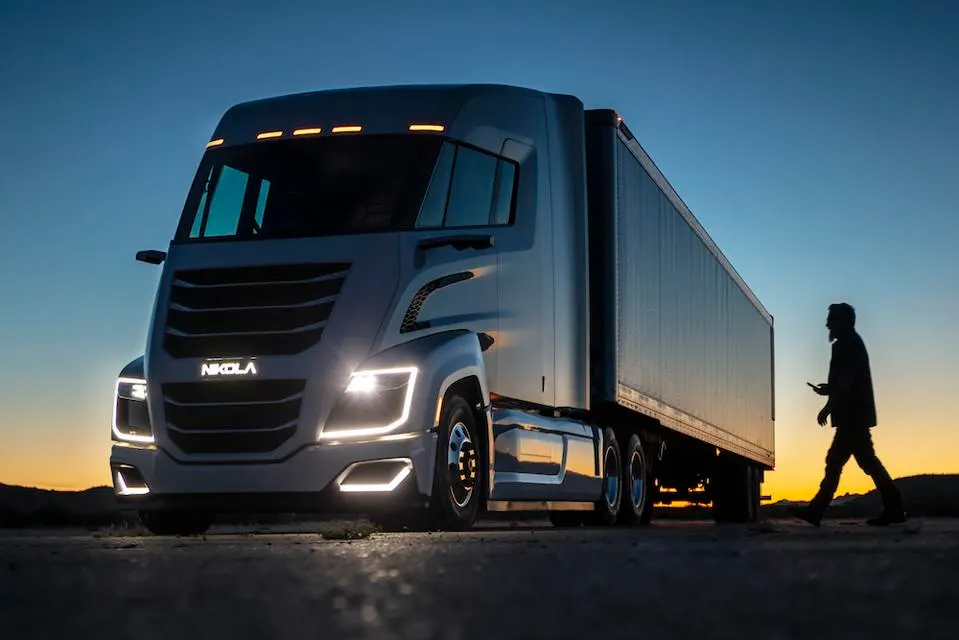Nikola Corporation: History, Stock & Bankruptcy

Nikola Corporation was once considered one of the most promising names in the electric and hydrogen truck industry. The company set out to revolutionize heavy-duty transport by combining advanced vehicle technology with new fueling infrastructure. Its trucks were designed to run on either battery-electric systems or hydrogen fuel cells. The idea was bold and visionary.
Nikola also planned to create a network of hydrogen stations to support long-haul trucking. Investors and analysts quickly compared it to Tesla, and expectations were enormous. But the company’s journey turned out very different from its early hype.
Foundation and Early Ambitions
Nikola Corporation was founded in 2014 by Trevor Milton. The company was named after the inventor Nikola Tesla, highlighting its focus on innovation. From the beginning, the mission was clear. Nikola wanted to build trucks that produced zero emissions and still offered the power and range of traditional diesel vehicles.
The company announced concept trucks like Nikola One and Nikola Two, which captured public imagination. By 2018, Nikola was already a known name in the alternative fuel industry. It had plans for both commercial trucks and even recreational vehicles. This ambition put the company in the spotlight.
Going Public Through a SPAC
Nikola took a different route to enter public markets. In 2020, it merged with VectoIQ Acquisition, a special purpose acquisition company. This deal allowed Nikola to be listed on Nasdaq under the ticker NKLA. The timing was perfect. Investors were excited about the future of electric vehicles, and Nikola promised something even bigger with hydrogen technology.
After the listing, the stock price soared. At one point, the company was valued higher than Ford. Nikola also announced the Badger, a pickup truck that could run on both battery and hydrogen power. Reservations opened, and excitement peaked.
Challenges and Controversy
The excitement did not last. In September 2020, short-seller Hindenburg Research released a report that accused Nikola of misleading investors. The report claimed that Nikola exaggerated its technology and even staged videos to promote its trucks. One video showed a truck rolling downhill, giving the impression it was moving under its own power.
The accusations triggered investigations by the SEC and the Department of Justice. Soon after, Trevor Milton resigned from the company. In 2022, he was convicted of fraud charges related to misleading statements. This event damaged Nikola’s credibility and reputation.
Technical Problems and Recalls
After the controversy, Nikola tried to move forward with real product deliveries. The main focus was on the Nikola Tre, a heavy-duty truck designed for urban and regional use. The company also pursued a hydrogen-powered version for longer distances. But problems continued.

Several Nikola trucks caught fire due to battery issues. Recalls followed, and production delays became common. Customers lost confidence, and sales remained low. Nikola also acquired Romeo Power to strengthen its battery technology, but this did not fully solve the challenges. The gap between ambition and execution became too wide.
READ MORE
Financial Struggles
Building trucks is an expensive business. Building both trucks and hydrogen stations is even more costly. Nikola faced huge financial pressure as losses mounted year after year. The company raised money by selling new shares, but this diluted existing investors.
Revenue remained small compared to expenses. By 2023, Nikola’s share price had collapsed below one dollar. The market no longer believed in its future. Investors who once saw Nikola as a rival to Tesla now saw it as a failing experiment.
Bankruptcy in 2025
In February 2025, Nikola Corporation filed for Chapter 11 bankruptcy protection. The company admitted it could not continue without restructuring. Trading of its shares was suspended on Nasdaq, and soon after, Nikola announced it would delist completely. Its stock now trades over-the-counter under the symbol NKLAQ.
The bankruptcy process involves selling assets to recover value for creditors. Lucid Motors has already agreed to purchase some of Nikola’s facilities in Arizona. However, Nikola’s hydrogen truck technology was excluded from this deal. The future of those projects remains unclear.
Products and Projects
Nikola Tre
The Nikola Tre was the company’s flagship commercial truck. It was available in both battery-electric and hydrogen fuel cell models. Limited numbers were delivered, but safety issues hurt adoption.
Nikola Badger
The Badger was announced in 2020 as a pickup truck that could run on both electricity and hydrogen. It generated massive attention, but the project never reached production. GM was initially a partner, but the deal was reduced, and the Badger was eventually cancelled.
HYLA Hydrogen Network
Nikola launched the HYLA brand to build hydrogen refueling infrastructure. The idea was to make hydrogen trucks practical by offering modular fueling stations. However, the project was capital-intensive and never scaled.
Lessons from Nikola
The story of Nikola Corporation is a lesson in both ambition and caution. The company had bold ideas that captured the imagination of investors and customers. But execution failed to match the vision. Misleading claims, technical problems, and financial struggles combined to destroy trust.
The collapse of Nikola shows how difficult it is to disrupt industries like trucking and energy. Success requires not just vision but also technology, capital, and credibility. Nikola’s downfall will likely be studied for years as an example of overpromising in the electric vehicle industry.
READ MORE
Conclusion
Nikola Corporation began with the dream of transforming transportation through hydrogen and electric trucks. It quickly rose to fame, attracted major investment, and inspired comparisons to Tesla. But controversy, recalls, and financial weakness changed the story.
In 2025, the company filed for bankruptcy, ending a dramatic chapter in the history of clean transportation. Some of its assets may continue under new ownership, but Nikola itself will be remembered as a cautionary tale of ambition outpacing reality.
